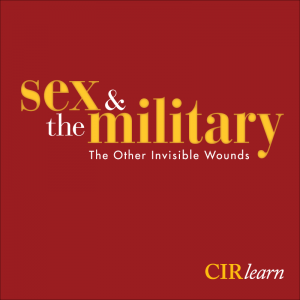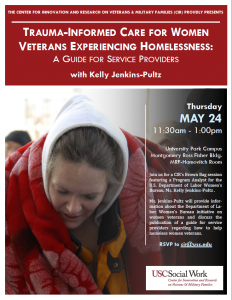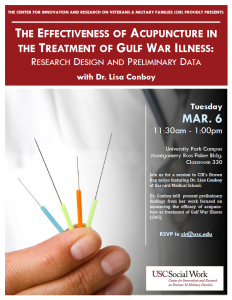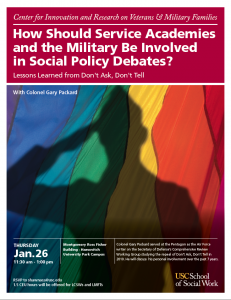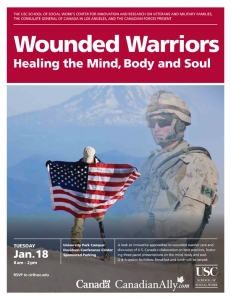![]()
The USC Center for Innovation and Research on Veterans & Military Families (CIR) has previously held training seminars for behavioral health providers and clinicians on a range of topics. Below you may access video recordings of previous events. If you’re interested in learning about upcoming training seminars, join CIR’s mailing list and be sure to check “CIRlearn Announcements.”
The Center for Innovation and Research on Veterans & Military Families hosted a conference to raise awareness of an increasing, yet overlooked problem facing military populations — sexual functioning. The speakers included: Dr. Kimberly Finney on the side effects of mental health medication, Maj. Steven Hudak on the urotrauma seen in today’s battlefield, Dr. Jo Sornborger about the importance of communication to establish intimacy, Dr. Timothy Hoyt on themes unique to military sexual trauma among male service members, Dr. Sarah Nunnink on emotional intimacy, and Dr. Doni Whitsett about key tips to begin discussion of sexual functioning issues with military clients.
(Visit Sex & Military page for more information.)
Toolkit – Standard pdf version
May 14, 2014
Dr. Marina Mia Cunin is an anthropologist who has conducted research on military spouses and their varied experiences. Based on individual and group interviews, as well as traditional fieldwork methods, her research highlights the diversity of groups and definitions of being a “military spouse.”
A military spouse herself, she hopes her fieldwork will contribute to the increasing awareness of the diversity of this community.
March 14, 2013
Dr. Kimberly Finney discusses essential information for behavioral health providers regarding the use of psychopharmacology in treating depression, a common and treatable mental health diagnosis. This presentation helps inform behavioral healthcare professionals by providing them with a basic understanding of the effects of psychotropic medications; reviews basic pharmacology principles and focuses on the importance of differentiating biological versus psychological symptoms of depression, as well as the benefits, risks, and adverse effects of SSRIs in the treatment of depression.
Col. Carl Castro (Ret.) discusses how military service is inherently dangerous. Service members are exposed to a wide variety of both physical and psychological stressors that cannot always be avoided. Within the psychological domain, the Military Occupational Mental Health Model was developed to serve as a unifying framework for the protection, early intervention and treatment of service members throughout their military career.
Veronica Lira, MSW, provides an essential overview of veteran benefits for providers. Having an understanding of veteran benefits is essential for building rapport and forming therapeutic alliance with veteran clients. Many providers find themselves navigating complex information about benefits as they attempt to provide timely and effective services for veterans. Armed with a greater understanding of veteran benefits, providers can focus on building rapport with their clients, rather than struggling with resource terminology. Understanding available veteran resources can also assist with decreasing workload for providers, as well as minimizing client frustration.
Kelly Jenkins-Pultz provides information about the Department of Labor Women’s Bureau initiative on women veterans and discusses the publication of a guide for service providers regarding how to help homeless women veterans.
Dr. Lisa Conboy of Harvard Medical School presents preliminary findings from her work on measuring the efficacy of acupuncture as treatment for Gulf War Illness, a complex, poorly understood illness characterized by many symptoms — including fatigue, sleep and mood problems, difficulty concentrating, difficulty thinking and finding words, and musculoskeletal pain. More than 100,000 of the 700,000 veterans deployed to the Persian Gulf in the first Gulf War have presented with medical complaints.
Conboy is a social epidemiologist and a sociologist with an interest in the associations between social factors and health. She is also a founding member of the Kripalu research collaborative which examines the mental, physical, and spiritual benefits of yoga, meditation, Ayurveda and other holistic and mind-body therapies.
Col. Gary Packard on the process and consideration involved in the Department of Defense’s repeal of its “Don’t Ask, Don’t Tell” (DADT) policy. Packard, head of the the Department of Behavioral Sciences and Leadership at the Air Force Academy, led the theam that drafted DoD’s plan to implement the repeal of DADT.
A conference focused on exploring innovative approaches to wounded warrior care in the United States and Canada. The conference was a collaboration between CIR, the Canadian Forces and the Canadian Consulate General of Los Angeles on best practices regarding the care of wounded warriors. Wounded Warriors featured separate panel presentations on the mind, body and soul as they pertain to the care of wounded warriors.


